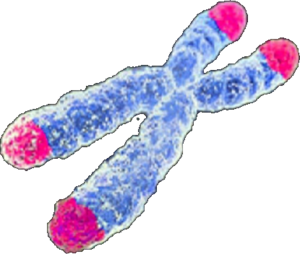Telomere Attrition
Telomere Attrition is a biological process that refers to the progressive shortening of telomeres, which are the protective end caps of chromosomes. Every time a cell divides, telomeres shorten slightly due to the inability of DNA polymerases to completely replicate the end of linear chromosomes. This gradual shortening can eventually lead to the loss of vital genetic information and signal cells to stop dividing or enter into a state of senescence or apoptosis. Telomere attrition is considered one of the primary hallmarks of aging and has been associated with various age-related diseases and conditions.
Telomeres and Their Function
Telomeres are repetitive nucleotide sequences at the ends of each chromosome, which protect them from deterioration or fusion with neighboring chromosomes. In humans, telomeres consist of thousands of repeats of a simple sequence: TTAGGG. These protective caps are essential for preserving the integrity and stability of the genome. Telomeres are bound by a complex of proteins known as shelterin, which protects the DNA ends and regulates telomere maintenance.
Mechanism of Telomere Attrition
During cell division, the DNA replication machinery cannot fully replicate the very ends of chromosomes, known as the 'end replication problem.' This results in progressively shorter telomeres with each cell division. In addition, factors such as oxidative stress and inflammation can accelerate telomere shortening.
Role of Telomerase in Telomere Lengthening
Telomerase is an enzyme that adds telomeric DNA to shortened telomeres, essentially rebuilding the telomere sequences. In most somatic cells, telomerase activity is insufficient or absent, leading to gradual telomere shortening over time. However, in certain cells like germ cells, stem cells, and some cancer cells, telomerase activity is high, allowing these cells to divide many times without significant telomere shortening.
Implications of Telomere Attrition
- Cellular Senescence: As telomeres shorten to a critical length, cells enter a state called replicative senescence, where they no longer divide. This is a protective mechanism to prevent the loss of essential genetic information.
- Genomic Instability: Extremely shortened telomeres can result in genomic instability, chromosomal abnormalities, and an increased risk of cancer.
- Age-related Diseases: Telomere attrition has been linked to various age-related diseases, including cardiovascular diseases, diabetes, and neurodegenerative disorders.
- Tissue Aging and Organismal Aging: In tissues where cells need to divide frequently, such as the skin and the lining of the gastrointestinal tract, telomere shortening contributes to the aging process and reduces the regenerative capacity of tissues.
Research and Potential Interventions
Extensive research is focused on understanding the mechanisms of telomere attrition and how to counteract its effects. Some potential interventions include:
- Telomerase Activation: Strategies to safely activate telomerase in somatic cells are being explored to extend the replicative capacity of cells and possibly delay aging.
- Lifestyle Factors: Studies have shown that lifestyle factors such as diet, exercise, and stress reduction can impact telomere length and the rate of telomere attrition.
- Antioxidants and Anti-inflammatory Agents: Since oxidative stress and inflammation can accelerate telomere shortening, these agents are being studied for their potential to slow down the rate of telomere attrition.
See Also
- Hallmarks of Aging
- Wikipedia - Telomere § Association with aging

